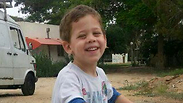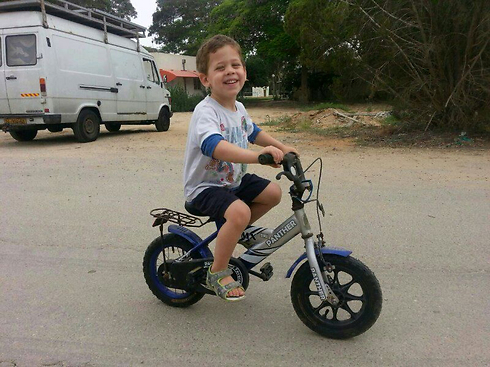
Daniel Tregerman
Mother of 4-year-old killed by mortar during Gaza war testifies in UN inquiry
Gila Tregerman and other Israeli residents of the Gaza border community gave their testimony to the Schabas Commission - the UN inquiry that Israel has officially boycotted.
Israel is officially boycotting a UN commission investigating possible war crime committed during Operation Protective Edge, known as the Schabas Commission, but this has not stopped Gaza border community members from testifying in front of the commission. In the past few days, several residents have given their testimony, including the mother of Daniel Tregerman – the 4-year-old Israeli boy who was killed by a mortar shell that hit his house towards the end of the summer Gaza war.
Gila Tregerman from Kibbutz Nahal Oz gave her testimony a few days ago via Skype and answered questions asked by the commission's chairman William Schabas. She told him of the terrible sense of loss that befell her and of the IDF's attempt to prevent Israeli civilians from being attacked. "I told (him) of how Hamas shot from population centers clearly knowing that the IDF would not fire, and they were not wrong. The IDF really did not fire. Why? Because we do not attack innocent civilians."
Tregerman told the commissioner that the IDF knew of rocket launchers that were located in populated areas and positioned to fire towards Israeli communities "and despite this (the IDF) did not fire because Israel saw the way Hamas was holding its citizens as human shields, children and adults."
"In addition, I told him how we also became refugees during the days of the war and of all the difficulties that arose as a result," she said.
The Schabas Commission was appointed by the UN Human Rights Council in Geneva in order to investigate the allegations of war crimes committed by Israel and Hamas during Operation Protective Edge.
Schabas called on Israel to cooperate with the committee after it was appointed and rejected the accusation that he is "anti-Israel."
"I don't hate Israel," Schabas said in an interview with Ynet in August, "I'm a friend of Israel. I was in Israel several times."
Gila Tregerman was not the only Israeli to give testimony to the commission. A delegation of Israeli citizens who live on the Gaza border arrived in Geneva to give their testimony. One after another, over a period of a few days, each resident sat in front of the commission panel and delivered their testimony – spanning from half an hour to forty-five minutes.
Each one of them recounted their experience of the summer war: Haim Yellin described his experience as head of a regional council on the Gaza border; Gadi Yarkoni and his wife Shoham from Kibbutz Nirim spoke of how Gadi was seriously wounded from the explosion of a mortar shell that landed in their community just an hour before the cease fire began.
Ronnie Kissin, a member of the Kerem Shalom Kibbutz, explained the threat of terrorist infiltrating from tunnels within Gaza; Tamar Avni-Auerbach, director of social services of the Eshkol Regional Council, spoke with Schabas about the emotional state of the residents and the trauma they went through; Esther Bochshtev, who was an emergency welfare coordinator at Kibbutz Nirim, shared her impression of the treatment residnts received while they were under fire; and Nadav Goldstein, a member of Kibbutz Kfar Aza and the CEO of a local factory, described the damage that was done to the economy as a result of the security situation.
Yellin, head of the Eshkol Regional Council, emphasized during his testimony that Hamas chose the path of terror despite "having 15 whole years to do everything for Gaza," and called on the members of the commission to stand against the attackers. "They also asked me about the IDF and I answered that we educate our sons to protect the State of Israel, to the point that they are willing to sacrifice their lives but they also know that killing is not the goal."
Yellin also said that the commission members were interested to know how Israelis who are under threat continue to develop and grow and Yellin responded that "even when there are pirates and robbers at sea – the ship does not stop sailing. We do not stop developing because of terror. Our nation knows more than anyone what is war. We are willing to go with our testimony to the end of the earth."
"We are not to blame for all the ills of the world and do not support terror. I asked the judge to make it clear to Europe and to the rest of the nations of the world that still have not understood that instead of investing energy in hate against Israel – that they invest in rehabilitating Gaza, in giving the Palestinians a horizon so that we will not meet here in another year," said Yellin. "Everyone holds responsibility for this."











